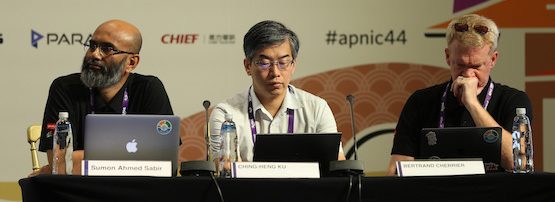
The Open Policy Meeting at APNIC 44 in Taichung, Taiwan reached consensus on half the proposals put before the community. Three others were rejected as the community remains divided about key aspects of managing the last of the IPv4 free pool.
The proposals reaching consensus have now been sent back to the Policy SIG mailing list for the final Comment Period before implementation. Community members can still make sure their opinions are heard by subscribing to the mailing list and responding to the emails which are still available in the archive.
.@APNIC Policy SIG Chair, Sumon Ahmed Sabir, reports on 6 proposals heard at #APNIC44. And 3 of them approved!#IPv6 #netgov @bdNetOpGroup pic.twitter.com/MIMP5DK1QX
— Paul Wilson (@apnicdg) September 14, 2017
The proposals reaching consensus were:
- prop-116: – Prohibit to transfer IPv4 addresses in the final /8 block
- prop-121: – Updating “Initial IPv6 allocation” policy
- prop-122: – Updating “Subsequent IPv6 allocation” policy
During the discussion of prop-116, the community asked the author to amend the proposal to increase the length of time custodians of Final /8 (103/8) space are required to hold their addresses before they can be transferred from two to five years. The author agreed to this and also to remove the phrase: “This restriction will end when final /8 address block (103/8) run out”.
In response to the approval of this change, the APNIC Executive Council issued a moratorium on 103/8 block transfers until the policy regarding this is stabilized.
According to the APNIC Policy Development Process (PDP), the three proposals reaching consensus will be forwarded to the Executive Council if the consensus holds following the Comment Period, which is due to conclude on 18 October 2017. Once endorsed by the EC, proposals are then implemented by the Secretariat.
The other two proposals reaching consensus were related and have clarified the evaluation criteria for very large IPv6 delegations. Specifically, requests made for larger than the minimum delegation (/32) “will be based on the number of users, the extent of the organization’s infrastructure, the hierarchical and geographical structuring of the organization, the segmentation of infrastructure for security, and the planned longevity of the allocation”.
Three proposals returned to authors
The proposals not reaching consensus at APNIC 44 were returned to the authors by the Chairs of the Policy SIG. This reflects the degree of disagreement within the community and carries with it an expectation that the author will modify the proposal to accommodate the feedback given during the first stages of the PDP.
The proposals returned to the authors are still active and may still be discussed on the mailing list. They are:
- prop-118: – No need policy in APNIC region
- prop-119: – Temporary transfers
- prop-120: – Final /8 pool exhaustion plan
Like prop-116, the proposal “prop-118: No need policy in APNIC region” is also about IPv4 transfers. The author of this proposal argues for the removal of demonstrated need when transferring IPv4 addresses, except where an inter-region transfer requires the receiving party to do so. In that case, recipients must provide a plan use of at least 50% of the resources within five years.
“Prop-119: Temporary transfers” tries to accommodate leasing agreements where a holder of addresses can do a non-permanent transfer, which would see the Secretariat reverse the transfer at a specific time requested by the two parties. This would allow organizations to register the IPv4 addresses in their own name. Unlike a customer assignment, where the original holder of the addresses is also the upstream Internet access provider; in a temporary transfer, the recipient network could be totally independent of the source account’s network operations.
The last proposal not reaching consensus was “prop-120: Final /8 pool exhaustion plan”. Current usage estimates indicate the pool will be exhausted in approximately two years and the proposal tries to get clarity about future delegations of IPv4 space after this time. Ensuring ‘fairness’ for both new network entrants and those already on the waiting list for resources is a difficult objective when there is so much demand and so little supply.
The Policy SIG Chairs requested the APNIC Secretariat prepare a summary of discussion for each of the proposals not reaching consensus. I’ll provide this soon to help the authors of prop-118, prop-119, and prop-120 modify their proposals in response to the community feedback they received in Taichung.
The views expressed by the authors of this blog are their own and do not necessarily reflect the views of APNIC. Please note a Code of Conduct applies to this blog.
